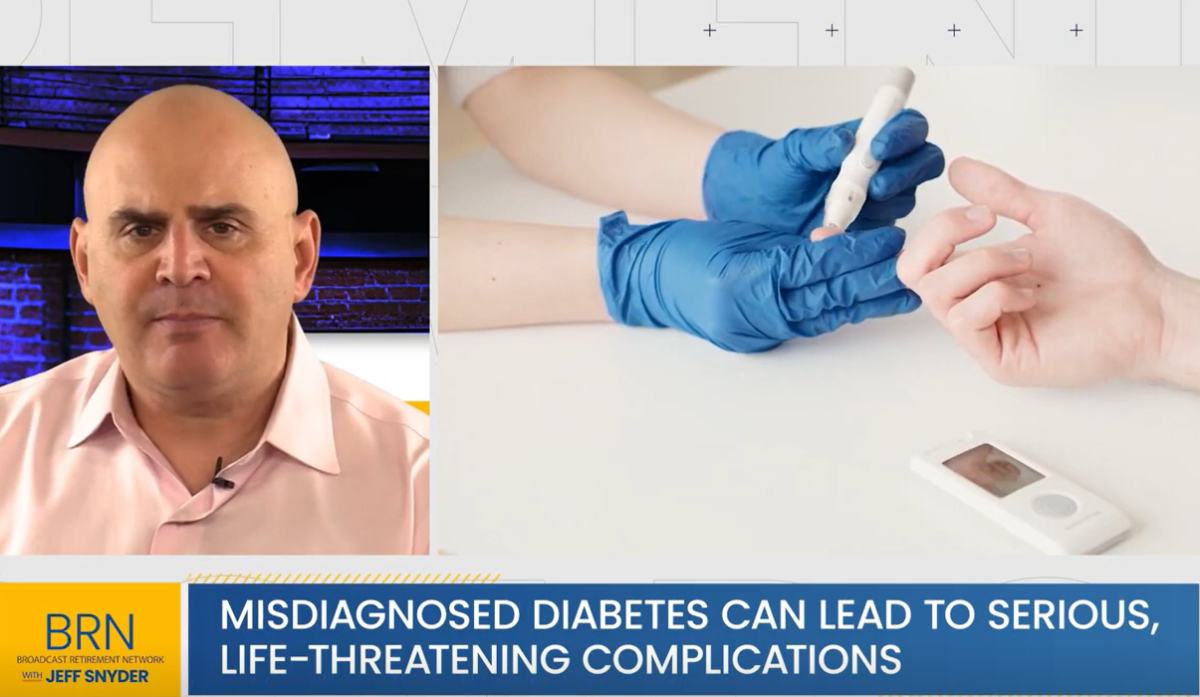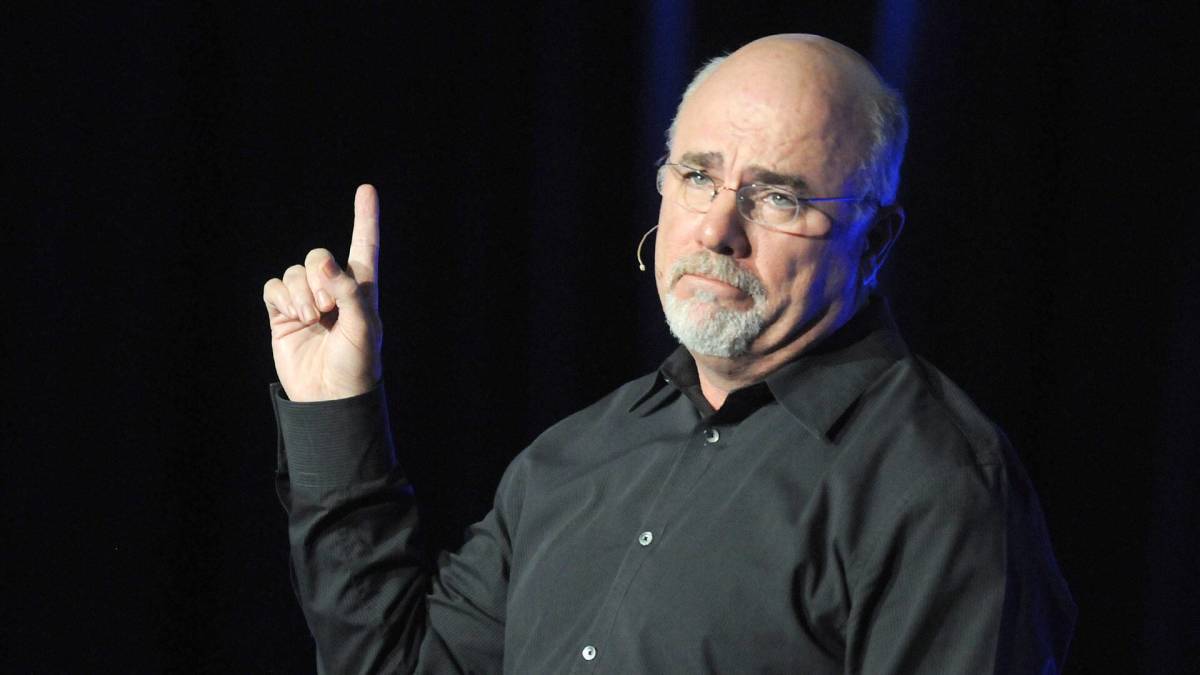Misdiagnosed Diabetes Can Lead to Life-Threatening Complications
Proper diagnosis and management are crucial to prevent organ failure, cardiovascular disease, and diabetic ketoacidosis

Diabetes is a condition that affects around 37 million Americans. High blood sugar can cause other health conditions over time, including nerve and eye damage, heart disease and kidney disease. Studies in 2023 estimated that up to 40% of adults over 30 with Type 1 diabetes may have been misdiagnosed with Type 2 diabetes. Misdiagnosed diabetes can lead to life-threatening diseases such as organ failure, cardiovascular disease, and diabetic ketoacidosis. Broadcast Retirement Network's Jeffrey Snyder discusses getting the right diagnosis and treatment with Lisal J. Folsom, MD, Norton Healthcare
JEFFREY SNYDER, BROADCAST RETIREMENT NETWORK
(0:04) This morning on BRN, misdiagnosed diabetes can lead to serious life-threatening complications. (0:12) And joining me now to discuss this is Dr. LaSalle Folsom of Norton HealthCare. (0:18) Dr. Folsom, great to see you. (0:19) Thanks for joining us on the program this morning.
LISAL J FOLSON, MD, NORTON HEALTHCARE
(0:22) Thank you so much for having me. (0:24) I'm delighted to be here.
JEFFREY SNYDER, BROADCAST RETIREMENT NETWORK
(0:25) It's great to have someone with your expertise and we appreciate you spending a few minutes with us. (0:30) Let's talk about diabetes and just a baseline question. (0:35) This is a disease that continues to expand here in the United States.
(0:41) It continues to rise in terms of, you know, a disease.
LISAL J FOLSON, MD, NORTON HEALTHCARE
(0:48) Yeah, absolutely. (0:49) And I think something that we often talk about is the rising cost of health care. (0:54) And one of the reasons that health care is increasing in cost is that there are more people being diagnosed with chronic health conditions and people are living longer.
(1:06) And so diabetes is certainly one of those chronic health conditions that is rising in diagnosis.
JEFFREY SNYDER, BROADCAST RETIREMENT NETWORK
(1:12) Yeah. (1:13) And look, I have seen the commercials, you know, knowing your A1C. (1:19) I've seen the continuous glucose monitor information, but can diabetes be misdiagnosed?
LISAL J FOLSON, MD, NORTON HEALTHCARE
(1:29) It's a loaded question. (1:31) We have specific diagnostic criteria to diagnose a person with diabetes mellitus. (1:39) And the reason I specify diabetes mellitus is that there are other types of diabetes or older terms that used to describe different health conditions affiliated or associated with the word diabetes.
(1:49) So what we're talking about today is diabetes mellitus, which is Latin for increased sweet urine. (1:59) And when they first described this condition, I would not do this today and I would not recommend anyone do this. (2:07) But there was a tasting of urine and it tasted sweet.
(2:10) And the reason for this is that people's blood sugar was high and they were peeing out this extra sugar in the urine. (2:17) So diabetes mellitus is truly hyperglycemia or high blood sugar. (2:22) And it's diagnosed using a few different tests that is recommended and endorsed by multiple medical societies, including the American Diabetes Association.
(2:33) And you can diagnose diabetes mellitus with a fasting blood sugar level with a hemoglobin A1C, Jeffrey, like you mentioned, or with an oral glucose tolerance test. (2:43) You can also diagnose it with a random blood sugar that's elevated if the person also has symptoms or clinical signs that would suggest they have higher blood sugars.
JEFFREY SNYDER, BROADCAST RETIREMENT NETWORK
(2:55) And, you know, if it goes undiagnosed, what are some of the ramifications of that? (3:03) So if you're misdiagnosed or you're not diagnosed at all, you fail to go to the doctor, you fail to get all your blood work done. (3:11) What are some of the ramifications there?
LISAL J FOLSON, MD, NORTON HEALTHCARE
(3:15) Yeah, absolutely. (3:16) And I think, you know, we always worry about what could happen to someone if they don't get the treatment that they need in the time that they need it. (3:25) When we think specifically about diabetes and type 2 diabetes is the type of diabetes that's typically more likely to be diagnosed in adults.
(3:36) It's actually the eighth leading cause of death in the United States. (3:40) We also know that people who have type 2 diabetes are two to four times more likely to have heart disease than people of the same age and the same sex and the same socio demographic information as someone who doesn't have diabetes. (3:56) And diabetes is the leading cause of blindness in adults between the ages of 18 to 64.
(4:02) So we know there's a lot of really scary potential long term health complications. (4:07) But in the shorter term, you just don't feel well if you have chronically high blood sugars that can cause people to feel tired. (4:18) They might not sleep well.
(4:20) They usually have increased thirst and then they're urinating more. (4:25) And that can happen during the day and night. (4:26) So that can interfere with sleep as well.
(4:28) And just overall, just feeling unwell. (4:33) And we already have so much going on in our lives as far as stress and other reasons for not feeling well. (4:39) Diagnosing diabetes if this is present and starting treatment right away can help people feel better in the short term as well as preventing long term chronic disease.
JEFFREY SNYDER, BROADCAST RETIREMENT NETWORK
(4:47) And these tests that you were discussing, the A1C, the hemoglobin A1C and some of the other tests, any general practitioner you go to, if you get your annual physical doctor, wouldn't they test for these markers?
LISAL J FOLSON, MD, NORTON HEALTHCARE
(5:07) They most likely will. (5:09) And the U.S. has a set of health screening guidelines that typically primary care providers will follow. (5:18) And that can include testing a A1C or a fasting blood sugar in patients who meet that criteria.
(5:25) Some reasons that they might want to test our age, age in general. (5:28) If someone is 35 years old or older, it's good to think about testing for diabetes. (5:33) If someone has a family history of diabetes, always a good reason to test.
(5:38) Or if someone has symptoms, then that would be another reason to screen for diabetes at your regular visit or in between.
JEFFREY SNYDER, BROADCAST RETIREMENT NETWORK
(5:45) And in terms of behaviors, in terms of, I don't know if you can reverse this, but especially if you're predisposed because of a genetic trait or disposition, predisposition. (5:59) But are there certain behaviors that we can do on our own that will minimize or lower our risk for diabetes?
LISAL J FOLSON, MD, NORTON HEALTHCARE
(6:09) Absolutely. (6:09) And this is one of my favorite things to talk about with my patients in clinic is if you can do something to improve your health and to improve your quality of life that is not taking a medicine. (6:26) Isn't that the best way to do it?
(6:29) Right. (6:29) So lifestyle modifications or changes is my favorite way to lower someone's risk of getting type 2 diabetes. (6:38) And I think we have to be pretty specific about what we're recommending because anybody can say eat healthy and move more.
(6:47) But what does that mean for the individual person? (6:50) And so what I typically will recommend as far as movement is including at least 30 minutes, five days a week or more of physical activity in your day. (7:00) And then as far as nutrition, really focusing on a whole foods plant forward nutrition plan.
(7:10) This means that you eat things that are as close to nature as possible. (7:15) If you think about a bag of potato chips versus a baked potato, a bag of potato chips looks nothing like a potato, but a baked potato looks like you could have just taken it out of the ground that day. (7:26) And that's kind of the rule of thumb is if you can't recognize where it came from or if you're turning around the package and it has a very long list of ingredients that are difficult to pronounce or understand, those are foods that you want to limit or decrease.
(7:41) And then increasing the amount of whole foods that are as close to nature as possible. (7:46) There's also very good data on decreasing the risk for diabetes and other chronic health conditions, including metabolic liver disease, heart disease, high cholesterol, high blood pressure by increasing the amounts of fruits and vegetables, whole grains, beans, nuts, seeds, legumes. (8:07) A lot of plant based foods can also lower that risk significantly.
JEFFREY SNYDER, BROADCAST RETIREMENT NETWORK
(8:13) And you mentioned five days a week of 30 minutes or more of exercise. (8:20) Do I need to run a marathon, do wind sprints or become a power lifter or can it be as easy as walking for 30 minutes to an hour?
LISAL J FOLSON, MD, NORTON HEALTHCARE
(8:30) Yeah, what a great question. (8:32) And the answer is please no, unless you want to do all of those things and then do them. (8:38) But typically, movement that's going to get you just a little bit out of breath, but you're still able to talk is the focus.
(8:45) So that's something that we refer to as moderate intensity physical activity. (8:50) So if you're walking very slowly down the street and looking at all the flowers, that doesn't really count. (8:59) But if you're moving at a pretty quick pace with a friend or your dog and you're having a conversation, hopefully your dog isn't talking back or this would be a whole nother conversation to have.
(9:09) But if you're able to have a conversation and move in a pretty rapid manner, that's kind of what we want to shoot for. (9:14) If you want to run a marathon, if you want to power lift, please do those things. (9:18) But physical activity is really important to customize to each individual person because you're going to be able to stick with something that you enjoy or at least that you don't hate if you're not somebody who really likes to be active.
JEFFREY SNYDER, BROADCAST RETIREMENT NETWORK
(9:33) And last question for you, Dr. Folsom. (9:35) In terms of at-risk groups, is it, and I think you've covered a little bit of this, but is it younger? (9:43) Are there certain parts of our population that maybe are more at risk than others to getting this disease and therefore maybe need to perk up their ears a little bit more while we're talking today?
LISAL J FOLSON, MD, NORTON HEALTHCARE
(9:55) Yeah, I think the things that we think about are when we're thinking about diabetes, we have to make sure we know which type we're talking about. (10:03) Type 1 diabetes is an autoimmune type of diabetes that's associated with pancreas destruction by the immune system. (10:15) And the pancreas makes the hormone insulin, which helps us to move the nutrition from the food that we eat into ourselves and make energy.
(10:24) That type of diabetes is the most common type of diabetes in children and young people. (10:30) About 95% of diabetes in kids is type 1 diabetes. (10:35) Type 2 diabetes, and that's typically the type of diabetes that we screen for as adults, is going to be more common the older we get.
(10:44) The older we're alive on this earth, the higher our risk for type 2 diabetes. (10:49) But there are also some specific risk factors like you alluded to, not only age, but a strong family history of type 2 diabetes. (10:58) If someone has had a history of gestational diabetes or diabetes diagnosed during pregnancy, that can also increase their risk.
(11:08) If they have a diagnosis of prediabetes, that can increase a person's risk for moving forward to type 2 diabetes as well.
JEFFREY SNYDER, BROADCAST RETIREMENT NETWORK
(11:18) Well, certainly it's a growing, I think you said it was the number eight cause of death in the United States. (11:26) We want to get it trending in the other direction. (11:28) Thank you so much, Dr. Folsom, for joining us, and we look forward to having you back on the program again very soon.
LISAL J FOLSON, MD, NORTON HEALTHCARE
(11:34) Such a pleasure. (11:34) Thank you for having me.
JEFFREY SNYDER, BROADCAST RETIREMENT NETWORK
(11:36) Support our daily programming by subscribing to our daily newsletter, The Morning Pulse, for all the news in one place. (11:42) Details, of course, at our website. (11:45) And we're back tomorrow for another edition of BRN.
(11:47) Until then, I'm Jeff Snyder. (11:48) Stay safe, keep on saving, and don't forget, roll with the changes.
What's Your Reaction?




















































